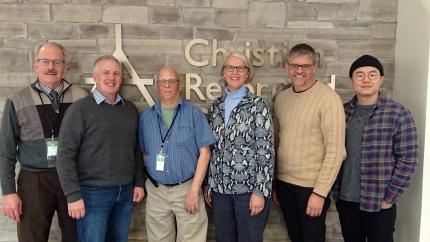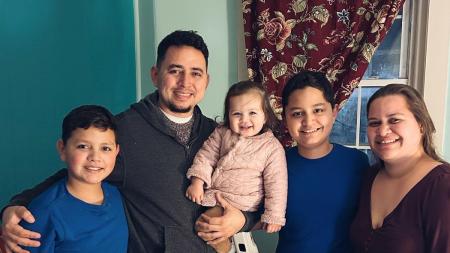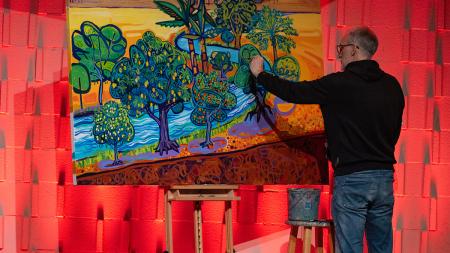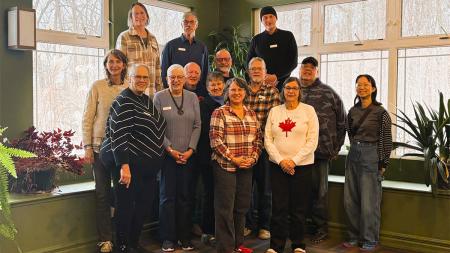Helping Ministers Become Pastors

Karl Van Harn (left) with five current CPE students Peter Janssens, Joseph Bowman, Naomi Ludeman Smith, Tim Luimes, and Shaun Jung.
Kristen VanderBerg
In 2015 the Christian Reformed Church in North America (CRCNA) and the Reformed Church in America (RCA) launched a six-year program focused on clinical pastoral education (CPE). Today the program is at its halfway mark and is set to run through 2021. It has already graduated 20 people and is showing many signs of success.
“My CPE experience has had an indelible effect on my ministry,” one RCA pastor, who participated in the program’s first group, noted on their evaluation form. “It was one of the best things for helping me grow as a pastor.”
CPE is specialized training that equips clergy and lay leaders to provide spiritual care in a pastoral way. It is used, for example, to prepare leaders to talk with persons who have been newly diagnosed with a disease, people who are grieving the loss of a loved one, and families going through divorce or other major life challenges.
Four units of CPE are required to become certified as a chaplain. Recognized by both the U.S. Department of Education and the Canadian Association of Spiritual Care, CPE is also an excellent and often-used training program for students going into congregational parish ministry.
The RCA/CRCNA CPE program, made possible through a grant from the Richard and Helen DeVos Foundation, is housed within Pine Rest Christian Mental Health Services in Grand Rapids, Mich. Pine Rest has been providing quality CPE training for more than 45 years. The new RCA/CRCNA program takes the great things about existing CPE training and applies them to pastors and seminary students in a wider variety of settings.
"We recognize the enormous value that CPE provides ministers," said Cor Kors, executive director of the Ministerial Formation Certification Agency of the RCA and a member of the advisory team overseeing the program. "The pastoral life requires self-awareness, spiritual health and clear role definitition."
At the same time, Kors pointed out, traditional CPE programs can be scarce and admission spaces limited. This can make it difficult for parish ministers and candidates for ministry to get CPE training.
“This project is wonderfully innovative,” explained David Koll, director of candidacy for the CRCNA, and another member of the advisory team. “A typical CPE program involves practical training in institutional settings such as a hospital. This program allows people to have CPE experience within their existing congregational settings.”
That’s exactly what appealed to the five people currently enrolled in the program.
“I’m seeking endorsement as a chaplain from the CRC,” said Peter Janssens, a current participant in the program who serves as a chaplain at a retirement and nursing home in Grimsby, Ont. “My first unit of CPE was done at a hospital. This [CRCNA/RCA program] is unique because I could do my learning in my current position. The things I learn fit really well in the context where I am working.”
Shaun Jung is a candidate for ministry in the CRCNA who is serving as a youth pastor in Richmond, B.C. Completing CPE units is required as part of his candidacy process, and the RCA/CRCNA program has been a great fit.
“Being in full-time ministry, I did not have time to pursue CPE training in a hospital or other setting,” he said, adding that he is “thoroughly loving it.”
Tim Luimes is neither a chaplain nor a candidate for ministry. He serves as a pastor at Blenheim (Ont.) CRC. He was ordained for ministry in 2013 and has been leading a congregation since then. Like many pastors, he faces a variety of pastoral care situations as part of his job, so he was intrigued when he heard about the CPE program.
“I saw the opportunity in an email,” he said, “and I thought, ‘This sounds interesting for my own benefit as a pastor.’”
As part of the program, Janssens, Jung, and Luimes have regular video conversations with two other participants: Joseph Bowman from Alliston, Ont., and Naomi Ludeman Smith from Aberdeen, S.D. The group of five are mentored by Karl Van Harn, director of pastoral services and CPE at Pine Rest.
“All of the participants are active in ministry or seminary. We meet twice a week for three hours by video. We also do site visits to each other’s context and get together in person three times for weekend retreats,” Van Harn said, describing the process.
“The program is not built using predictable or sequential topics,” added Ludeman. “We bring our own learning objectives to it. Karl then advises us and massages the outcomes.”
At their regular meetings, each participant presents real-life examples of pastoral care events they have been a part of. Their peers reflect on the interactions and provide feedback. This helps each participant see their own situation more objectively and helps them discover ways to improve for the future.
“I’ve been the pastor. I’ve done the visits and listened to people,” said Bowman. He explained that in his time with his CPE colleagues, though, these roles are reversed. “The pastor becomes the patient. My peers ask me how I was feeling when I met with that person, what I did, and how I could improve.”
“There’s a lot that has to do with self-awareness and understanding where certain emotions come from,” added Janssens. “The goal is for us to be confident in who we are so that we can provide a nonanxious presence when we step into a pastoral care setting.”
The process is extremely valuable to those who are a part of it, and it is resulting in ministry leaders who are better equipped to provide pastoral care.
“This program is an incredible and unassuming jewel for pastors,” said Sarah Roelofs, director of Chaplaincy and Care Ministry for the CRCNA. “It is truly a blessing to be able to gather together to learn from one another, ask hard questions of one another, and get honest feedback on how others experience you as a pastor.”
"The program has allowed individuals to appreciate who they are in the Reformed context as pastors - how to minister in a complex and hurting world where individuals struggle with God's sovereignty and to experience how grace manifests itself through the mere presence of the minister," added Kors.
Up to 12 people (six in each of two cohorts) can participate in the program each year. Priority is given to students attending a CRCNA or RCA seminary, candidates for ministry in each denomination, and current CRCNA and RCA pastors. Twenty people (13 RCA, 6 CRCNA, and 1 from another denomination) have completed the program. The current cohort of five includes four CRCNA people and one person from another denomination.
For the program’s next cohort, which would begin in August 2019, leaders are exploring whether there is interest in the Chicago, Ill. or New Brunswick, N.J. area. For more information, please email [email protected].


